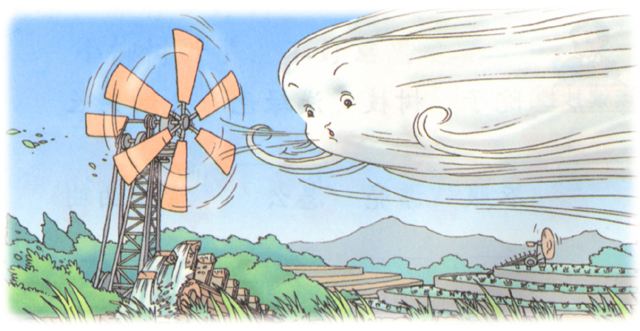(单词翻译:单击)
听力文本
Now, the VOA Learning English program Words and Their Stories, our weekly show about common expressions in American English.
Wind is a powerful force in nature. Wind energy is partly responsible for great waves in the world's oceans. Winds can help create powerful storms, such as tornadoes and hurricanes.
From very light winds, or breezes, to strong gales, wind is a force you can't see but can surely feel. Its power can be captured to create electricity for cities and the countryside.
Wind can also power many expressions in American English.
Let's start with a simple one.
If you run like the wind, you are a very fast runner.

After running, sometimes you can feel energized. The runner gets what we call a second wind. We use this expression when we were tired, but then get more energy to finish something. For example, sometimes I feel tired after work. But after a short rest and a cup of tea, I get my second wind. I'm ready to do something fun with my friends and family.
Now, people who throw caution to the wind take a chance. This means they become careless or carefree, depending on the situation. People forget what they should be doing and just do what they want to instead.
Now, if you are doing something difficult, it is good to have the wind at your back. This way it is easier to go forward. It's always more difficult to do something in a strong wind -- unless you are sailing.
Knowing the direction of the wind is the most important part of sailing. When wind fills a sail, it makes the boat go faster. When you or I have wind in our "sails," we have the energy and power to do what we want.
If you take the wind out of someone's sails, you keep them from reaching their objectives. You create a barrier or block them in some way. In life, it's a good idea to surround yourself with people who want to fill your sails with wind and not take it out.
Wind and sailing give us another expression.
If you are three sheets to the wind, you have had way too much alcohol to drink. You are so drunk that you have a hard time standing up.
Several websites explain that in this expression "sheets" are the ropes used to control the sails on a boat or ship. If these ropes are left blowing in the wind, the crew might lose control – sort of like a drunk person.
Now, let's turn from sailing to music.
Many songwriters use the image of wind in their songs. If something such as an idea is blowing in the wind, it is being discussed but has yet to be decided.
You might have heard Bob Dylan's song "Blowin' in the Wind".
How many deaths will it take 'til (until) he knows
That too many people have died?
The answer, my friend, is blowin' (blowing) in the wind
The answer is blowin' in the wind
The answer, my friend, is blowin' (blowing) in the wind
The answer is blowin' in the wind
Does Dylan mean the answer is undecided? Or does he mean that the answers to the problems he sings about will spread across the world like seeds carried away by the wind? When asked in an interview, he didn't give a clear answer. He simply said the answer is "blowin' in the wind."
Dylan uses another "wind" expression in the song "Subterranean Homesick Blues." But the meaning is clear when he sings "you don't need a weatherman to know which way the wind blows."
Here, he means that you don't need someone knowledgeable or in power to confirm something for you. Just trust yourself. You can figure it out on your own.
So, when you know which way the wind blows, you know what is going on.
Now, some things are hard to do when there is no wind. Sailing a boat and flying a kite are two good examples. But other things are really hard to do in the wind, such as lighting a candle.
That brings us to our last expression for today.
A candle in the wind describes something that is weak, unprotected and likely to fail or possibly even die.
In the early 1970s, Elton John and Bernie Taupin wrote the song "Candle in the Wind" in honor of actress Marilyn Monroe, who died at the age of 36.
In 1997, Elton John performed a version of the song, with different wording, at the funeral of Diana, Princess of Wales.
She died in a car crash in Paris while trying to escape photographers. Like Marilyn Monroe, Princess Diana was only 36 years old.
And that's Words and Their Stories. I'm Anna Matteo.
If you have similar expression using "wind" in your language, let us know in the Comments Section. Or simply practice using one or more of the expressions you heard here.
重点解析
1.three sheets to the wind 醉酒
He had three sheets to the wind and had to be carried home.
他喝得烂醉如泥,被抬回家去了。
2.lose control 失控;失去控制;着了魔
But I am trying to built myself up, no longer to be the little girl that it seems everything can make me to lose control.
但我尽最大努力增强自身能力,不要再是那个好象任何事情都可以使我失控的样子。
3.which way the wind blows 看清形势
I'm going to see which way the wind blows before asking her about a raise.
我打算先观察一下形势,然后再向她提加薪的事情。
参考译文
现在是VOA《词汇掌故》节目时间,这是一个每周更新的关于美式英语常用表达的节目。
风(wind)是自然界里的一股强大的力量。风能让世界上的海洋刮起巨浪。风也能助力强风暴的形成,例如龙卷风(tornadoes)和飓风(hurricanes)。
从轻风(light winds)或者微风(breezes)到强风(strong gales),你看不见风却能真切感受到它。风能能被利用来为城市和乡村发电。
风也能生成美式英语里的很多表达。
让我们从一个简单的表达开始。
如果你跑得飞速(run like the wind),那你是一个跑步很快的人。
跑完之后,有时候你会感觉充满力量。这个跑步者又有了精神(a second wind)。我们会在疲倦的时候用到这个表达,然后我们会有更多的精力去完成某事。例如,有时候工作完后我会觉得累。但休息会,喝上一杯茶后,我感觉精神又好了。我可以和朋友以及家人完了一番了。
那种毫无谨慎(throw caution to the wind )之心的人是在冒险(take a chance)。这意味着他们面对情况大意或者一点不在意。人们忘了自己该做的事情,却只做他们想做的事情。
现在,如果你正做一件难事,如虎添翼(have the wind at your back)自然是好事。这样的话事情进行下去就简单些了。在强风中去做某事总是很艰难的,除非你是在航海。
识别风向(direction of the wind )是航海的一个重要组成部分。当风鼓满了帆(sail),船会走得更快。若你或者我在“航行”中鼓足了干劲,那我们做自己想做的事情时会更有动力和精神。
如果你先发制人(take the wind out of someone's sails),你阻挡别人达成他们的目标。你在某种程度上制造了障碍或者阻拦了他们。在生活中,让身边都是给你动力而不是阻拦你的人是一个好主意。
风和航行给我们带来了另一个表达。
如果你醉酒(three sheets to the wind)了,你喝了太多酒。你喝得太多以至于你站起来都困难。
有几个网站解释了这个表达里的“sheets”指的是船上用来控制帆的绳子。如果这些绳子在风中飘荡,那么全体船员就会失控,类似于一个醉酒的人。
现在,让把我们把话题从航海方面转到音乐方面。
许多词曲作者会在歌曲里用到风的意象。如果某物如一个想法悬而未决(an idea is blowing in the wind),那关于这个想法大家还在议论中,没有做出决定。
你也许听过鲍勃·迪伦的歌曲《答案在风中飘扬》。
要牺牲多少条生命才能知道
太多的人已经死去
答案啊 我的朋友 在风中飘扬
答案它在这风中飘扬
答案啊 我的朋友 在风中飘扬
答案它在这风中飘扬
迪伦的意思是还没有答案?或者他的意思是他唱到的问题会散布于全世界,就像种子随风而散一样?当一场采访中被问到这个问题时,他没有给出明确的回答。他只是说答案在风中飘扬。
迪伦在歌曲《隐秘思乡布鲁斯》里用到了另一个“wind”表达。但是这次意思很明显,他唱到“你并不需要气象员来告诉你风往哪边吹”。
这里,他的意思是你不需要一个知识渊博或者有权势的人来替你确认什么。相信你自己。你自己能搞定。
所以,当你看清形势(which way the wind blows)的时候,你知道会发生什么。
有些事情没有风就很难进行。驾驶帆船和放风筝就是两个典型的例子。但是其他事情有风又真得很难做到,如点蜡烛。
这就涉及到我们今天最后一个表达了。
A candle in the wind(风中之烛)形容脆弱、无保护以及可能会倒下甚至可能会死掉的事物。
在29世纪70年代早期,艾尔顿·约翰和伯尼·陶平为纪念36岁去世的女演员玛丽莲·梦露写了歌曲《风中之烛》。
1997年,艾尔顿·约翰在威尔士王妃戴安娜的葬礼上用完全不同的词表演了这首歌。
她在躲避摄影记者的时候出了车祸。和玛丽莲·梦露一样,戴安娜王妃也年仅36岁。
这就是今天的《词汇掌故》节目。我是我是安娜·马特奥。
如果你的语言里有类似的“wind”的表达,在评论区告诉我们吧。或者用你收听到的一个或更多的表达来练习一下吧。


